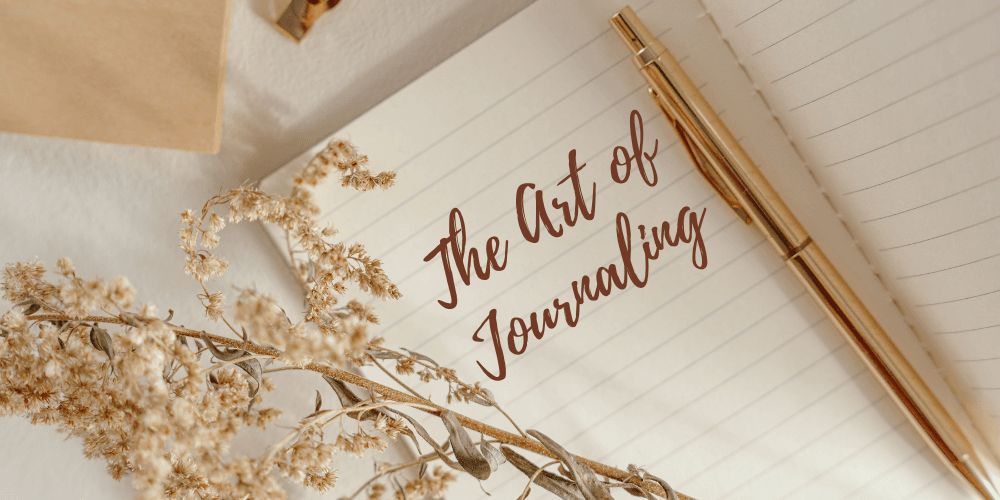In the digital whirlwind we live in—a torrent of notifications, social media feeds, and endless inputs—finding clarity and inner peace feels like an elusive treasure. This is where the art of journaling wields its power. A journal serves as a sanctuary for our minds, a place to unpack thoughts, emotions, dreams, and aspirations.
What is Journaling?
At its core, journaling is the act of expressing yourself through writing. It\’s a personal exploration recorded in a notebook, digital file, or any medium that suits you. Think of journaling as having a compassionate, non-judgmental conversation with yourself. There are no right or wrong ways to do it; it\’s ultimately a tool to uncover your inner truths.
Why is Journaling Important in Today\’s World?
Our modern lives are saturated with external stimuli and demands. Journaling provides a counterbalance, offering these invaluable benefits:
- Reduced Stress and Anxiety: Journaling allows you to vent your worries onto the page, creating a sense of release and easing mental burdens.
- Enhanced Self-Awareness: As you write, recurring patterns in your thoughts and emotions emerge, providing profound insights into your inner self.
- Improved Problem-Solving: Journaling helps untangle complex situations by bringing structure and objectivity to your thoughts.
- Boosted Creativity: Your journal is a safe space to brainstorm, experiment, and let your imagination spark without judgment.
- Personal Growth: Journaling becomes a record of your path, allowing you to follow your progress and celebrate milestones.
- Emotional Healing: Writing about difficult experiences can support healthy processing and integrating past events.
The Pros and Cons of Journaling
Like any practice, journaling has its advantages and potential challenges:
Pros
- Mental Health Benefits: Journaling is a proven tool for reducing stress and anxiety. Writing out worries externalizes them, making them feel more manageable. It also promotes mindfulness and helps you track your mood patterns.
- Enhanced Self-awareness: As you analyze your thoughts and feelings on the page, you gain insights into your behaviours, motivations, and core values. This self-awareness is essential for personal growth and making positive changes.
- Improved Cognitive Function: Journaling helps you organize your thoughts, improving memory and problem-solving skills. It boosts focus as you dedicate time to untangling complex emotions or situations.
- Creative Outlet: Journaling provides a space for free expression, away from external judgment. Writing without the pressure of an audience can spark ideas and unlock your imaginative side.
- Accessibility and Affordability: Journaling doesn\’t require specialized equipment or hefty investments. Most people can start journaling with an essential notebook and a writing utensil.
- Record of Progress: Your journal becomes a testament to your journey. Re-reading previous entries can highlight your growth, resilience, and the challenges you\’ve overcome.
Cons
- Potential for Rumination: Journaling can reinforce unhealthy thought patterns if you focus excessively on negative experiences or emotions without seeking solutions. It\’s essential to pair journaling with positive self-talk and constructive problem-solving.
- Facing Difficult Emotions: Delving into past traumas or deeply buried feelings can be emotionally challenging. While journaling can aid in processing these experiences, having a support system in place or considering professional guidance if needed is crucial.
- Time Investment: Journaling, especially deep reflection, requires dedicated time and effort. Consistency is key to reaping its full benefits, but it can be troublesome to maintain amidst busy schedules.
- Privacy Concerns: Unless you take measures to safeguard your journal (password protection, hidden location), there\’s a risk of your private thoughts being read by others. It can inhibit honesty, particularly if you\’re journaling about sensitive topics.
- The Comparison Trap: Social media often showcases beautifully curated journals, making it easy to fall into the trap of self-criticism. Remember, journaling is about personal expression, not perfection.
Important Considerations
The pros of journaling generally outweigh the cons when approached in a healthy and balanced way. Here are some tips to mitigate the potential downsides:
- Set Boundaries: If specific topics feel too overwhelming to write about, permit yourself to skip them.
- Use Prompts: Journaling prompts can guide you towards more constructive reflection when rumination arises.
- Pair with Action: Use journaling insights to initiate positive changes in your life.
- Seek Support: If journaling consistently triggers difficult emotions, think about reaching out to a trusted friend or therapist.
Different Types of Journaling: A Closer Look
The beauty of journaling lies in its adaptability. Here are some popular varieties:
- Gratitude Journaling: This focuses on cultivating an appreciative mindset. Each entry might include:
- Three things you\’re grateful for and why.
- A positive experience from the day.
- An act of kindness you witnessed or performed.
- Bullet Journaling: Highly adaptable, this method blends:
- Calendar and scheduling: Monthly overviews, daily logs, and future trackers.
- To-do lists: Categorized by project, importance, or context.
- Specialized trackers: Habits, moods, reading lists, finances, etc.
- Collections: Ideas, inspirational quotes, random thoughts.
- Art Journaling: A playground for visual expression and experimentation. Think:
- Drawings, paintings, or mixed media pieces.
- Collages and artistic arrangements.
- Doodles and spontaneous sketches.
- Written reflections interwoven with images.
- Dream Journaling: Dedicated to capturing the surreal world of dreams. Entries often include:
- Detailed descriptions of dream imagery and narratives.
- Initial emotions and impressions upon waking.
- Recurring symbols or themes for analysis.
- Potential interpretations or personal connections.
- Travel Journaling: A vibrant scrapbook of your adventures. You might incorporate:
- Daily summaries of experiences and highlights.
- Reflections on new cultures, people, and places.
- Sketches, ticket stubs, or collected memorabilia.
- Food reviews and local vocabulary snippets.
- Freeform/Reflective Journaling: The heart of traditional journaling. This style is open-ended:
- Daily life observations and ponderings.
- Emotional processing and working through challenges.
- Goals, dreams, and brainstorming sessions.
- Reflections on books, movies, or impactful conversations.
Beyond the Basics
The beauty of journaling is its endless potential for customization. Here are some more specialized forms:
- Food Journaling: Tracking meals, ingredients, and reactions for health or dietary reasons.
- Nature Journaling: Recording observations, sketches, and reflections on the natural world.
- Project Journaling: Dedicated to a specific goal, task, or creative endeavour.
- Quote/Inspiration Journal: Collecting meaningful words, lyrics, or passages.
- Shadow Work Journal: A safe space to explore darker emotions or unconscious patterns.
Remember, journaling is a deeply personal journey. Feel free to combine styles, invent your methods, and let them evolve alongside your interests and needs!
Journaling in the Real World: Case Studies
Case Study 1: Trauma Therapy
- Context: Journaling is frequently integrated into therapeutic approaches for individuals who have experienced trauma.
- Methods: Therapists may guide clients using journals to express emotions surrounding the traumatic event, challenge negative thought patterns, and practice reframing their experiences.
- Outcomes: Studies suggest that journaling can aid in reducing symptoms of PTSD, depression, and anxiety in trauma survivors. It allows for safe emotional processing within a supportive therapeutic context.
Case Study 2: Boosting Workplace Creativity
- Context: Companies may encourage journaling as a tool for employees to problem-solve, explore innovative ideas, and reduce work-related stress.
- Methods: Short journaling sessions may be incorporated into team meetings or individual workdays. Prompts might focus on project brainstorming, overcoming obstacles, or reflecting on work-life balance.
- Outcomes: Research suggests journaling can enhance problem-solving skills, improve focus and clarity, and foster a more innovative work culture.
Case Study 3: Goal Achievement and Personal Growth
- Context: Individuals use journaling to set, track, and reflect on personal goals like health, career, or relationships.
- Methods: Journaling might involve recording daily actions towards a goal, identifying obstacles, celebrating milestones, and reframing setbacks as learning opportunities.
- Outcomes: Journaling creates accountability, fosters self-awareness around patterns that hinder or support goal achievement, and provides a continuous record of progress and motivation.
Case Study 4: Shadow Work and Inner Healing
- Context: Shadow work refers to the psychological process of exploring and integrating unconscious aspects of the self, often including suppressed emotions, beliefs, or behavioural patterns.
- Methods: A \”Shadow Work Journal\” provides a dedicated space for exploring these complex and often challenging aspects. Prompts encourage honest self-examination without judgment.
- Outcomes: When approached with self-compassion (and sometimes professional guidance), shadow work journaling can promote greater self-acceptance, healthier relationships, and the release of old emotional burdens.
Additional Notes:
- These case studies offer a glimpse into journaling\’s transformative power. Its applications extend to countless areas, including athletic performance, spiritual growth, grief processing, and more.
- Research on the long-term benefits of journaling is ongoing. Its effectiveness often depends on the individual\’s commitment, openness to the process, and any additional support they receive.
Journaling\’s Real-World Impact: Stories of Transformation
The benefits of journaling extend far beyond abstract concepts like self-awareness and stress reduction. Let\’s look at some examples of how this reflective practice has made tangible, positive changes in people\’s lives:
- The Entrepreneur\’s Breakthrough: Sarah, a struggling small-business owner, felt overwhelmed and directionless. She began a daily \”business journal\” to analyze challenges, brainstorm solutions, and document her ideas. Over time, journaling helped her refine her business model, identify a profitable niche, and feel empowered in her decision-making.
- Healing a Broken Heart: Michael\’s world felt shattered after a painful breakup. He poured his grief, anger, and self-doubt into a journal. The writing process allowed him to move through the stages of heartbreak, eventually recognizing his strengths and unhealthy relationship patterns. Journaling provided the clarity he needed to rebuild a sense of self and move forward with hope.
- The Artist\’s Inspiration: Maya, a painter, often wrestled with creative blocks and self-criticism. Her art journal became a playground for experimentation – raw sketches, colour studies, snippets of inspiration, and honest self-assessment. By freeing herself from the pressure of a \”finished product,\” she rediscovered her artistic voice and developed a more sustainable creative practice.
- Managing Chronic Illness: Emily lives with a chronic health condition that brings pain and unpredictable flare-ups. Journaling helps her track symptoms, medication responses, and emotional triggers. This record assists in discussions with her medical team, while the act of writing itself eases anxiety and fosters a sense of agency in managing her condition.
A Note on Transformation:
Journaling is not a magic solution; it takes dedication and introspection. However, it offers a catalyst for change. It provides a space for honesty, where we see ourselves more clearly. This clarity, in turn, empowers us to take constructive actions in our businesses, relationships, creative pursuits, and overall well-being.
Tips on How to Improve the Art of Journaling
- Find Your Groove: Experiment with times of day, writing tools, and locations.
- Be Kind to Yourself: Avoid self-criticism; your journal is a judgment-free zone.
- Use Prompts: Questions or ideas can jumpstart your writing when stuck.
- Review Past Entries: Reflect on your growth and recurring themes.
- Integrate with Life: Insights gained from journaling can be applied to real-world situations.
- Don\’t Force It: If you\’re not inspired, take a break and return later.
- Mix It Up: Vary the format of your entries: lists, poems, letters, etc.
- Set Realistic Goals: Start with short sessions a few times a week and gradually increase.
Conclusion
The art of journaling is a lifelong exploration. It\’s a personalized practice with the potential to enhance self-knowledge, ignite creativity, and promote emotional well-being. If you\’re seeking a tool for self-discovery, stress relief, and personal growth, grab a pen and notebook, find a quiet space, and let the words flow.
Disclaimer
Journaling can be a powerful and valuable tool for personal growth and self-reflection; however, it should not be regarded as a substitute for professional mental health support. If you\’re experiencing significant emotional distress, please seek guidance from a qualified therapist or counsellor.


